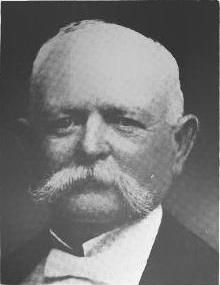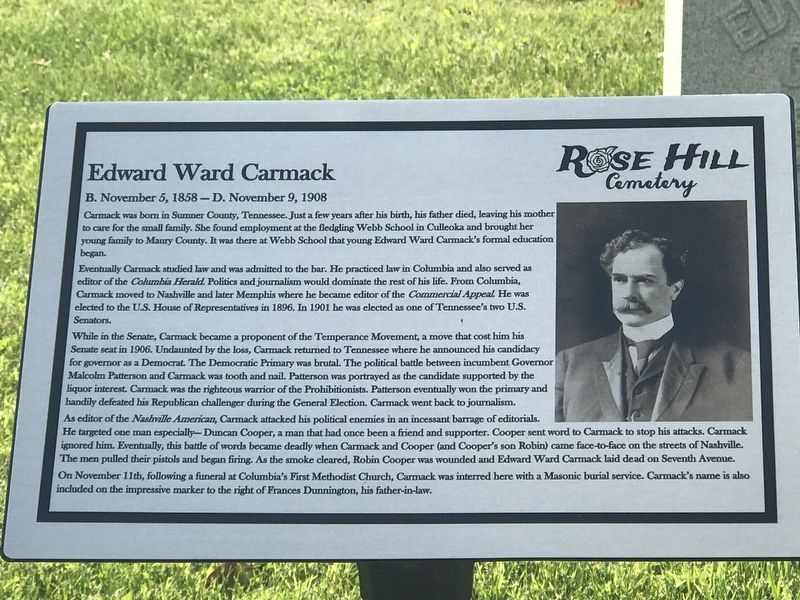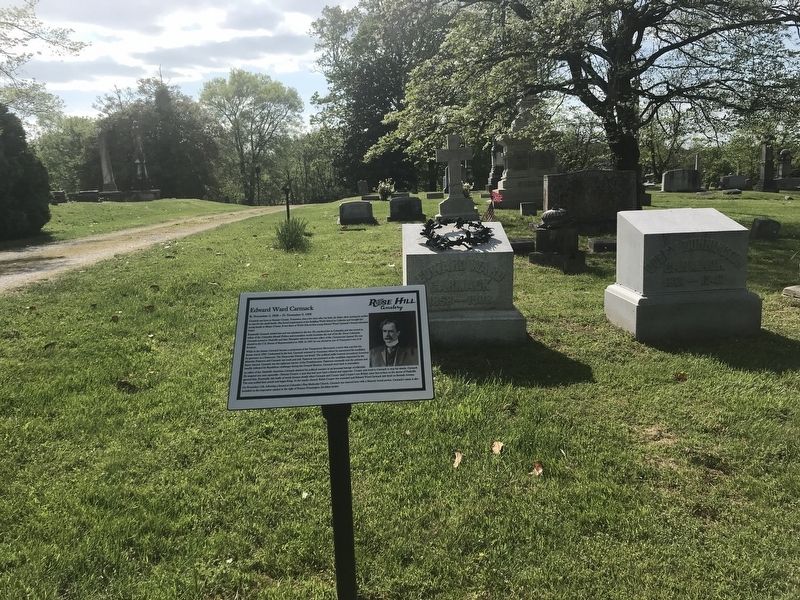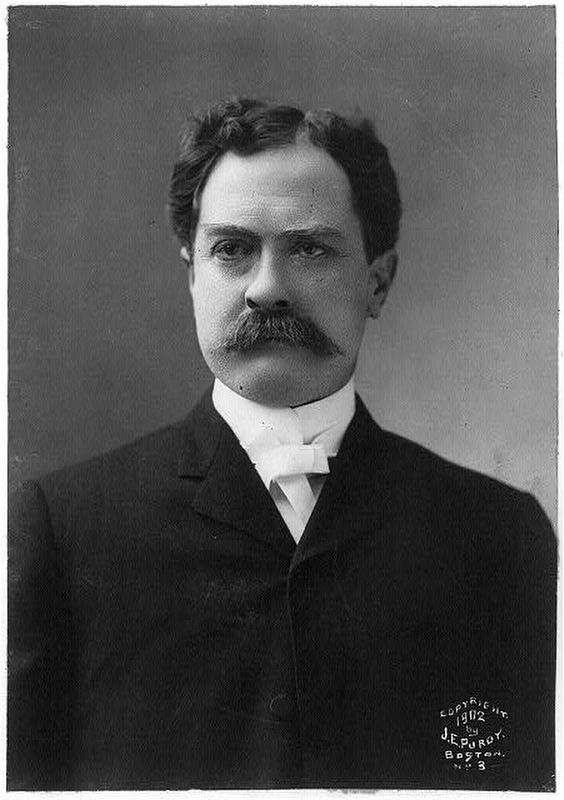Columbia in Maury County, Tennessee — The American South (East South Central)
Edward Ward Carmack
B. November 5, 1858 – D. November 9, 1908
Eventually Carmack studied law and was admitted to the bar. He practiced law in Columbia and also served as editor of the Columbia Herald. Politics and journalism would dominate the rest of his life. From Columbia, Carmack moved to Nashville and later Memphis where he became editor of the Commercial Appeal. He was elected to the U.S. House of Representatives in 1896. In 1901 he was elected as one of Tennessee's two U.S. Senators.
While in the Senate, Carmack became a proponent of the Temperance Movement, a move that cost him his Senate seat in 1906. Undaunted by the loss, Carmack returned to Tennessee where he announced his candidacy for governor as a Democrat. The Democratic Primary was brutal. The political battle between incumbent Governor Malcolm Patterson and Carmack was tooth and nail. Patterson was portrayed as the candidate supported by the liquor interest. Carmack was the righteous warrior of the Prohibitionists. Patterson eventually won the primary and handily defeated his Republican challenger during the General Election. Carmack went back to journalism.
As editor of the Nashville American, Carmack attacked his political enemies in an incessant barrage of editorials. He targeted one man especially – Duncan Cooper, a man that had once been a friend and supporter. Cooper sent word to Carmack to stop his attacks. Carmack ignored him. Eventually, this battle of words became deadly when Carmack and Cooper (and Cooper's son Robin) came face-to-face on the streets of Nashville. The men pulled their pistols and began firing. As the smoke cleared, Robin Cooper was wounded and Edward Ward Carmack laid dead on Seventh Avenue.
On November 11th, following a funeral at Columbia's First Methodist Church, Carmack was interred here with a Masonic burial service. Carmack's name is also included on the impressive marker to the right of Frances Dunnington, his father-in-law.
Erected by Rose Hill Cemetery.
Topics. This historical marker is listed in these topic lists: Cemeteries & Burial Sites • Communications • Government & Politics. A significant historical date for this entry is November 5, 1858.
Location. 35° 36.188′ N, 87° 1.802′ W. Marker is in Columbia, Tennessee, in Maury County. Marker can be reached from the intersection of Cemetery Street and Whatley Street, on the right when traveling north. Touch for map. Marker is at or near this postal address: 219 Cemetery St, Columbia TN 38401, United States of America. Touch for directions.
Other nearby markers. At least 8 other markers are within walking distance of this marker. The Confederate Monument (a few steps from this marker); Lt. James C. Wooten, II (a few steps from this marker); Rose Hill Confederate Memorial (a few steps from this marker); Major Nathaniel F. Cheairs (within shouting distance of this marker); Edward Franklin “Pop” Geers (about 300 feet away, measured in a direct line); Alfred Osborn Pope Nicholson (about 400 feet away); Side by Side (about 500 feet away); Lt. Joseph A. Irvine (about 500 feet away). Touch for a list and map of all markers in Columbia.
More about this marker. It contains a significant error: Carmack actually was editor of The Tennessean, while Duncan Cooper was editor of the Nashville American.
Also see . . .
1. Edward W. Carmack. Wikipedia entry on the noted attorney, newspaperman and political figure. (Submitted on April 26, 2022, by Duane and Tracy Marsteller of Murfreesboro, Tennessee.)
2. Across the Muddy Chasm. Background of the Carmack-Cooper feud and the consequences of its explosive climax. (Nashville Public Library blog, posted Oct. 20, 2018) (Submitted on April 26, 2022, by Duane and Tracy Marsteller of Murfreesboro, Tennessee.)
3. Cooper v. State. An important ruling on the concept of self-defense resulted from one of the most famous murder trials in Tennessee history. (Tara Mitchell Mielnik, Tennessee Encyclopedia, posted Oct. 8, 2017) (Submitted on April 26, 2022, by Duane and Tracy Marsteller of Murfreesboro, Tennessee.)

Unknown via Current Literature Vol. 45, No. 6 (public domain), December 1908
4. Duncan Brown Cooper (1844-1922)
Although he did not fire a shot during the deadly street confrontation with Carmack, he was convicted of second-degree murder and sentenced to 20 years in prison. He spent no time in prison as he was pardoned by Gov. Malcolm R. Patterson.
Credits. This page was last revised on April 26, 2022. It was originally submitted on April 26, 2022, by Duane and Tracy Marsteller of Murfreesboro, Tennessee. This page has been viewed 153 times since then and 32 times this year. Photos: 1, 2, 3, 4. submitted on April 26, 2022, by Duane and Tracy Marsteller of Murfreesboro, Tennessee.


